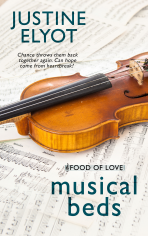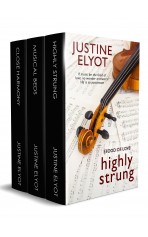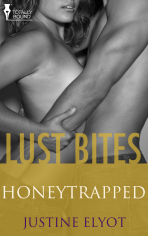Of all the days for a bomb scare on the Victoria Line, they had to choose this one.
Lydia Foster hugged her new violin case, stripped now of all the shiny stickers and stars of her battered but beloved student number, as the strip lights flickered on and off. Despite the ominous situation, most of the occupants continued reading their newspapers and listening to their iPods, well used to sudden and inexplicable standstills in dark tunnels. But Lydia could not be so sanguine. She checked her watch, agitated, and puffed out her cheeks when the long and short hands gave her news she didn’t want.
“Are you late for a concert?”
She almost jumped out of her seat. People just didn’t talk to you on Tube trains, but the white-haired gentleman to her left didn’t seem to know this rule.
“Um, no. A rehearsal, actually,” she said, when she’d made all the usual lightspeed calculations—Is he a maniac? Will he ask me weird, pervy questions? Would it be very rude of me to ignore him?
“I always wanted to play the violin,” the man confided. “Are you in a string quartet?”
“No, an orchestra. It’s my first day. First rehearsal. So I really don’t want to be late.” She sighed, looking up and down the carriage as if this might set the train back in motion.
“An orchestra! Professional?”
“Yes. The Westminster Symphony.”
The man took a breath and nodded, gratifyingly awed. Lydia loved the reception she got when she told people she was with the WSO. I have arrived.
“You’ll be working with that Milan fellow.” The gentleman chuckled. “Quite a character. Did you watch The Next Big String?”
Lydia blushed. Of course she had. Her massive crush on first violinist Milan Kaspar had been a large part of her reason for auditioning for the orchestra in the first place.
“Of course, they always have to have the Big Bad Judge on those talent contests,” mused Lydia’s companion. “I’m sure he’s nothing like that in real life. Rather difficult to work with otherwise, I should imagine. Oh, but I shouldn’t be saying this to you on your first day. I’m sure your nerves are bad enough as it is.”
Lydia coughed out a half-laugh. “Uh huh,” she managed to say. Her face felt as if it were on fire. All she could think about was the crafty morning orgasm she had teased out of her tense body, thinking about Milan Kaspar judging her playing, finding it wanting and giving her a little private lesson of his own. But why would he be interested in her, when rumour had it he had been seeing Tilda Fox-Boyce, the patrician and perfectly-coiffed presenter of the television programme? Of course he wouldn’t.
“Good-looking chap, though. I’m sure he has his pick of the ladies.”
Before Lydia could reply to this inflammatory remark, the train juddered into life.
“Due to a bomb scare at Victoria, all passengers are advised to alight at Pimlico. I repeat…” The intercom droned on.
“Fuck,” Lydia swore under her breath. She would have to walk the last part of the journey, since Pimlico Station didn’t link up to any other Tube line.
“Good luck.”
“Thanks. I’ll need it.”
As the curving, white-tiled station wall slid past the windows, she readied her violin case, preparing for a shuffle, then a sprint.
Out in the sludgy, grey cold of a January afternoon in London, Lydia raced up Vauxhall Bridge Road. Her heart pounded and her legs turned to mush, but she didn’t stop until she arrived at the building, just off the end of the road, which acted as the orchestra’s rehearsal space.
Reaching the door, she gasped for breath, doubling over her violin case. She was half an hour late.
“Fucksticks,” she panted, entering the empty lobby and following the muffled musical sounds coming from a set of doors halfway down a staircase.
Nobody noticed her when she pushed one door open and sidled in as unobtrusively as she could, hiding in an obscure corner until an obvious moment to introduce herself arrived.
She took the opportunity to watch the orchestra, her eyes settling quickly and naturally on the person she most wanted to check out—Milan Kaspar.
Oh, my God—there he was, in the flesh. She could only see his back and part of the side of his head, his violin wedged between firm chin and broad shoulder, his caramel-coloured hair flying as he bowed. He always gave the music his all, thought Lydia, starry-eyed, her pulse jumping high. It was as if he and his instrument were one. What were they playing? Something Viennese and waltzy, by the sounds of it. Oh, yes—Weber’s Invitation to the Dance.
The music made Lydia feel joyous and light-spirited. Despite the long run up Vauxhall Bridge Road, she felt an urge to twirl around and dance. If only she were wearing a flouncy taffeta skirt instead of jeans and Converse trainers. She bounced discreetly on the soles of her feet, swaying to the infectious beat, moving forward into the room until the woman at the back on percussion caught sight of her, turned and smiled a welcome.
The music stopped abruptly and Josh Clayton shook his head and folded his arms. Lydia recognised him as the conductor who had auditioned her, along with two of the trustees and a random violinist—Milan had been away filming.
“No, no, no, this is dragging. Some of you aren’t following my beat.”
“Some of us aren’t seeing your beat.”
The deep, accented voice was unmistakable. Lydia almost dissolved in a pool of lust on hearing Milan’s famously dark tones.
“Yes, well, we’ve had this discussion before,” said Clayton irritably. “And it always ends up the same way. Keep your eye on the baton and you won’t miss a thing.”
“But we do!” a violinist to Milan’s right objected. “I didn’t catch the change in tempo at vivace at all.”
“What do you want? A signpost?”
Lydia grimaced at Clayton’s obvious exasperation.
“It might help,” said Milan dryly.
“Listen, I can’t make this any more obvious! I’ve never worked with such a bunch of mules in my life. What is wrong with you people?”
“Mules!” A cellist stood up, shoulders back, spoiling for a fight. Despite the aggressive stance, Lydia thought he must have been one of the most beautiful men she had ever seen, if you liked pale, delicate youths with eyelashes like road sweepers. On balance, she preferred the more muscular Milan, but all the same, she found herself mesmerised by the cellist's bottomless eyes. “Do not insult us! We are musicians, not animals!”
“If you’re musicians, prove it!” thundered Clayton. Then, clutching his forehead, “Oh, you know what? Forget it. I’m done here. Fuck you. Good luck.”
He flung his baton to the ground and marched off, pushing Lydia out of his way with his shoulder so that she fell gracelessly to the floor in his wake.
“Oh my God, are you okay?” The female percussionist rushed over and knelt by her side, transmitting a strong waft of Armani Diamonds to Lydia’s nostrils.
“Yes, yes, fine, just a bump.” Lydia allowed the woman to help her up.
When she looked over towards Milan, she noticed him high-fiving the cellist, while a great deal of rowdy laughter and gossip seemed to be going on.
“Are you the new violinist? Sorry you’ve seen us like this, what an introduction.” The woman patted Lydia down, tutting. She was very Mother Hen-ish for such a sleek and glamorous-looking woman, Lydia thought. There wasn’t a hair of her black bob out of place, and her makeup looked professionally applied.
“I’m Vanessa, on percussion, as I’m sure you’ve worked out. Welcome to the WSO. Oh, dear. Milan’s so naughty.”
Vanessa shook her head as they both watched the first violinist hold court in the centre of the string section before mounting the conductor’s podium, taking his place as the orchestra’s leader.
He held his bow in the air and waved it with one powerful arm. Silence fell.
“Okay!” he said, eyes flashing, a picture of triumph and exuberance. “We are, once more, minus a conductor. But we still work! The music can still be played. For now, I lead from the violin. Yes?”
Some applause and a few ragged cheers indicated approval of Milan’s words.
“You are learning,” he said with a wicked flash of a grin. “In my country, we are experienced in revolution. More than you British. But you are learning.”
God, he was even more handsome in the flesh, if that was remotely possible. Lydia drank in his strong, rangy body, his arrogant posture, his high cheekbones and prominent nose. The gesture he had performed so often on The Next Big String—the sweep of the brow and toss of the hair—was such a familiar lust-trigger that Lydia’s knees weakened. He was six feet and one inch of undiluted charisma and he was…oh, God. He was looking straight at her.
He jabbed his bow in her direction.
“Who are you?”
Dozens of necks swivelled, dozens of pairs of eyes roved over Lydia, who shrank back self-consciously.
“Er, Lydia Foster. Violinist.”
He frowned and she quailed.
“You are late.”
“Sorry. Bomb scare on the Victoria Line.” The words came out somehow, but they sounded foreign. And what was this meek, squeaky little voice?
“Bombs? We let bombs stand between us and our music? No. We don’t.”
Lydia tried to breathe in, but found that her lungs were full. Her urge to scream ‘Stop staring!’ at the rest of the orchestra was mercifully quashed by the closed-up state of her throat.
Milan waved his bow impatiently.
“Come on, then,” he snapped. “Sit down. Get your violin out.”
Eyes fixed on the floor, Lydia scurried through the banks of chairs to the back row of the first violins, too mortified to hear Milan’s subsequent words about how to play the Weber piece to his satisfaction. Her fingers fumbled with the catch of her case and she almost broke a string trying to get the instrument out, conscious of the curious gazes of all the other violinists.
“Nice fiddle,” whispered the middle-aged man next to her, a note of sympathy in his voice. “Don’t worry about Milan. That’s just the way he is. It isn’t personal.”
“No?” she whispered back, grateful for the reassurance.
“He’ll have forgotten all about it by the time we’ve finished this piece.” The man winked, settling his chin on the edge of his instrument, bow poised across the strings.
Lydia thought she ought to do the same. Milan finished his spiel and came off the platform to his chair on the outer perimeter of the first violinists, though he remained standing, needing to be visible to the whole orchestra.
He held up his bow for a few seconds before counting in the beautiful cellist, who played the opening bars solo before being joined by the woodwind for the slow introduction.
Lydia watched the cellist’s smooth, dark hair fall, fringing his face as he bent over his instrument. Then Milan raised his bow, ready for the tumble into waltz tempo, and she began to play.
Surrounded by exhilarating dance music, Lydia forgot the woes of the moment and became nothing but a bow hand and fingers pressing on strings, her head whirling along with the imaginary waltzers, keeping pace with the black notes that whizzed past her eyes. Yes, she belonged here. Yes, this was right. Everything would be all right after all.
Incredible to think that she was working with the man whose deft bowing she followed, taking her cue from the speed of his arm and the wild flying of his hair. I am working with Milan Kaspar! I am his colleague!
It was two hours before they made it to the end of the piece, two hours of stopping and starting, picking every phrase apart, being shouted at or coaxed or charmed by Milan along the way. Once those two hours were over, Lydia felt that she had fought and won a battle. She was a member of the orchestra now and it held her undying loyalty.
“Good, that’s good, that’s promising.” Milan, clearly enjoying his new conducting role, treated the orchestra to a full-beam smile. “We see what tomorrow brings when Clayton hands in his resignation. I hope the Trust will think we can do this.”
‘I can do this’, you mean, thought Lydia cynically, packing away her violin.
She was craning her neck, looking for the friendly percussionist, planning to invite her for a post-rehearsal coffee, when her attention was distracted by an imperious click of the fingers.
“You. New girl.”
Lydia couldn’t quite believe it, but Milan was pointing at her, his eyes intent. He tossed his head and beckoned a long, pale finger.
Struggling to contain her breath, Lydia trotted up to him, wondering whether to expect an apology, a welcome, a scolding or a proposition, or something else completely.
“You know where Chappell’s is?” he asked brusquely.
“Of course.” Everyone knew where Chappell’s was. It was the most famous music shop in the UK.
He fumbled in his pocket and proffered a twenty-pound note.
“I need an A string. Eudoxa.”
Lydia’s mouth fell open. She looked from Milan to the banknote and back again. He was serious.
“Well? Why wait? Take it. I’ll be in the Delius Arms. You know it?”
“Next door,” said Lydia, taking the note before she could stop herself.
“Good, good. I’ll see you there.”
He nodded formally then swung around, dismissing her in favour of a group of other string players who appeared to be waiting for him.






















 Facebook
Facebook Twitter
Twitter